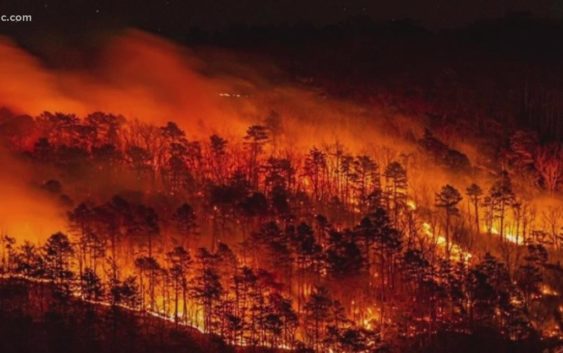- Recovery continues for western NC nearly two months after Hurricane Helene
- Recovery continues for western NC nearly three months after Hurricane Helene
- Cast of Scandal reunites to show support for western North Carolina after Hurricane Helene
- Tropical Storm Sara threatens to bring flash floods and mudslides to Central America
- Hurricane-stricken Tampa Bay Rays to play 2025 season at Yankees' spring training field in Tampa
Wildfire prevention while enjoying the great outdoors

The North Carolina Forest Service said careless debris burning is the biggest cause of wildfires across the Tar Heel State.
CHARLOTTE, N.C. — Hold onto your hat, it’s now the windiest time of year in Charlotte, and the relationship between high winds and dry air causes spring fire season to ramp up in North Carolina.
ALSO ON WCNC CHARLOTTE: Weather IQ: Facts you need to know about lightning
Just like we’ve seen the images of wildfires rip across Colorado and Texas, the same thing can happen here in the Carolinas. In fact, nearly 14,000 acres burned in North Carolina last year.
March and April are by far the windiest time of year. On average, sustained winds are higher than in any other month. Added to that — a combination of dry air and warm temperatures will only add fuel to the fire and cause fires to get out of hand during the spring.
The primary red flag criteria? More often it’s when relative humidity is less than 25% and winds of 25 mph or greater.
The North Carolina Forest Service said careless debris burning is the biggest cause of wildfires across the Tar Heel State.
The fire danger rate is expected to increase from high to very high over the next two days.
A quick note to remember: Don’t burn on windy and dry days, and especially avoid outdoor burning during drought conditions. Instead, consider using an alternative approach such as using the dry vegetation for mulch.
Use extreme caution if you must burn. Be sure to only burn vegetation and not trash or other household items. Build a small pile of leaves or brush, keep a water hose, rake, bucket, and shovel to help control the fire. In addition, never leave the fire unattended.
Here’s a how-to guide on wildfire prevention as you enjoy the outdoors this season.
You can report wildfires by calling 911.
Contact KJ Jacobs at kjacobs3@wcnc.com and follow him on Facebook, Twitter and Instagram.